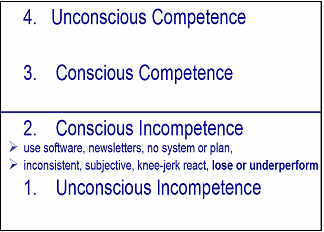Typical attributes of the Unconscious Incompetence level that we discussed last week include relying on the advice of others as the basis for making trading decisions (including brokers, the media, hot tips, chat rooms, newsletters and forums – typically referred to as ‘market noise’), and having no clearly defined and unambiguous strategy, system or trading plan for engaging the market. As a result, a very high percentage of traders and investors who embark on the active investment journey quit as losers after their first year. They bow out frustrated with the markets and with themselves and justify their actions through statements such as “the markets are rigged”, “the markets are all based on insider information” and other justifications for their inability to develop the necessary skills to achieve outperformance of the market indices.
Those who choose to persevere and to actively learn and develop the necessary skills for success will move to the next level of skills acquisition and learning, that of Conscious Incompetence. People at this level recognise and concede that they do not understand or know how to do something, This is an important step of awareness but they still do not know how to achieve competence.
At this level, in the trading arena, individuals chop and change their tools, start using technical and/or fundamental analysis software, subscribe to a newsletter or regular subscription service such as Fat Prophets or Australian Stock Report, watch stock market TV shows and experiment with different technical indicators and charting software. Because they are now paying for or paying more for their toolset and have more knowledge, they assume that they will become successful. Not so, but they have started the journey.
Their hit rate of random wins starts increasing but it is still not high enough to outweigh the loss and large loss trades and to generate a steadily rising equity curve. They are either still net losers, are profitable but still under-performing the market indices, or, at best, have outperformed but are uncertain about whether they can repeat their profitable trading. For an active investor who is putting in lots of time time, energy and effort this is unacceptable.
Their buy and sell decision making is subjective and inconsistent, using different criteria for entry into trades based on a combination of their new toolsets and the ‘noise’ of outside influences. Tips cause knee-jerk reactions and they justify their decisions based on their analysis software and newsletters. They trade this tip, let the next tip or two go, and then do the one after, each with illogical ‘gut-feel’ position sizes. They hesitate rather than act, resulting in chasing the trade and buying at a much higher price. Hesitation and reservation also cause delay in selling, resulting in eroding profits and larger loss trades than otherwise would have occurred.
In short, they lack structure, rigour and consistency in their trade selection, execution and amount of capital placed in each trade, mainly due to fear of losing or missing out.
At this level, the incompetent still thinks at the individual trade level and has not moved to the portfolio level of thinking (this topic has been discussed in earlier blog postings). They put undue significance on individual winners and/or losers, resulting in undue emotional reaction. They do not actively invest according to well organised processes that make up a well documented investment plan.
A bull market hides these inadequacies and provides a false indication of an individual’s level of incompetence which will be magnified in a bear market where large loss trades occur that wipe out portfolios. For a classic example of this, we need look no further than recent events in global equity markets. The sustained bull-run in which people of all levels of competence were able to make money came to a crashing end in late 2007. Unconscious Incompetents and Conscious Incompetents had their portfolios fall in value in line or worse than the market indices. They were to learn that their level of skill was far from adequate to consistently protect their capital and make money from the markets across a broad range of market conditions. As the old saying goes, they had mistaken a bull market for brains!

To become consistently successful in the market, the individual needs to ‘move above the line’ to acquire the level of skill that is Consciously Competent. We will delve further into this topic next week and take a look at how we begin to move to this level of competence in our trading and investing activities.
